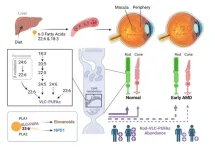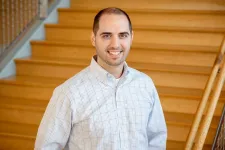(Press-News.org) Embargoed for release until 5:00 p.m. ET on Monday 11 September 2023
Annals of Internal Medicine Tip Sheet
@Annalsofim
Below please find summaries of new articles that will be published in the next issue of Annals of Internal Medicine. The summaries are not intended to substitute for the full articles as a source of information. This information is under strict embargo and by taking it into possession, media representatives are committing to the terms of the embargo not only on their own behalf, but also on behalf of the organization they represent.
----------------------------
1. Self-reported “night owls” more likely to have unhealthy lifestyle behaviors, significantly increased diabetes risk
Large study of middle-aged nurses found those with an evening chronotype were more likely to engage in an overall unhealthy lifestyle particularly smoking, poor sleep and physical inactivity and had a 72 percent higher risk of developing diabetes
Abstract: https://www.acpjournals.org/doi/10.7326/M23-0728
URL goes live when the embargo lifts
A study of more than 60,000 middle-aged nurses found that people with an evening chronotype, or a circadian preference to feel energetic later in the day, experienced an increased risk for diabetes and were more likely to report unhealthy lifestyle behaviors, such as smoking, poor sleep and physical inactivity, compared with persons with a morning chronotype. The authors caution that profession, education, and socioeconomic status of study participants may affect results. The findings are published in Annals of Internal Medicine.
Chronotype, also known as circadian preference, is a partly genetically determined construct and refers to one’s inclination for earlier or later sleeping times. An estimated 8% of the population has an evening chronotype, which has been linked to poor metabolic regulation, disrupted glycemic control, metabolic disorders, and higher incidence and prevalence of type 2 diabetes. However, the reasons for the observed association between evening chronotype and increased diabetes risk are not well understood.
Researchers from Brigham and Women’s Hospital and Harvard Medical School conducted a prospective cohort study of 63,676 nurses aged 45 to 62 years with no history of cancer, cardiovascular disease, or diabetes from 2009 to 2017. The authors found that participants with a “definite evening” chronotype were 54 percent more likely to have an unhealthy lifestyle than participants reporting a “definite morning” chronotype. Persons with evening chronotype also had a 72 percent higher risk of developing diabetes during the follow-up period. The authors report that this associated weakened but persisted even after adjusting for all measured lifestyle and sociodemographic factors. They emphasize that these results are restricted to persons who did not work recent night shifts. Future investigation in other populations leveraging genetic determinants for chronotype is needed to determine whether their findings are applicable to men, non-White racial or ethnic groups, or other socioeconomic classes. Moreover, generational differences in diet, exercise, and body weight may limit the applicability of their findings to younger or older generations or current times.
An accompanying editorial by authors from the Harvard T.H. Chan School of Public Health and Harvard Medical School highlight that several factors, including psychological factors, type of work, and possible lifetime changes to chronotype could confound the results of this study. They add that the results suggest that circadian misalignment due to a mismatch between chronotype and work timing, rather than the chronotype, may be a potential mechanism for these results. The authors suggest that this study adds to the growing evidence that reassigning evening chronotype workers to night shifts may improve sleep among shift workers and improve their metabolic health. Finally, they note that these results point to the potential benefit of developing standardized tools to assess chronotype regularly throughout a person’s life.
Media contacts: For an embargoed PDF, please contact Angela Collom at acollom@acponline.org. To speak with the corresponding author Tianyi Huang, ScD, please email Cassandra Falone at cfalone@partners.org.
----------------------------
2. Only about a quarter of adults overdue for colorectal cancer screening report receiving a clinician recommendation for screening during wellness visit
Prevalence lowest among marginalized racial/ethnic and socioeconomic groups
Abstract: https://www.acpjournals.org/doi/10.7326/M23-1341
URL goes live when the embargo lifts
Most adults overdue for colorectal cancer (CRC) screening report that they did not receive a screening recommendation from their clinician during a wellness visit in the past year, especially among historically marginalized populations. Even if some adults underreported receiving a recommendation due to low recall (e.g. not remembering or understanding what was discussed with their clinician during a past appointment), the findings highlight a major communication gap about CRC prevention in the clinical setting. The findings are published in Annals of Internal Medicine.
More than 1 in 3 U.S. adults is overdue for CRC screening. Receiving a clinician recommendation is the strongest and most consistent determinant of CRC screening participation. Lack of clinician recommendation may contribute to low uptake of CRC screening, but the magnitude of this problem is unknown.
Researchers from the American Cancer Society, Surveillance and Health Equity Science pooled nationally representative data from the 2019 and 2021 National Health Interview Survey to estimate, the prevalence of receiving a clinician recommendation for CRC screening among underscreened U.S. adults, overall and by demographic, socioeconomic, and health care access characteristics. The analysis included 5,022 adults who were eligible and overdue for CRC screening and had a wellness visit in the past year. Overall, only about a quarter of respondents reported receiving a clinician recommendation for CRC screening and the rate of recommendation was lowest among marginalized racial/ethnic and socioeconomic groups. The authors suggest that interventions are needed to remove barriers that prevent effective counseling on CRC prevention.
Media contacts: For an embargoed PDF, please contact Angela Collom at acollom@acponline.org. To speak with the corresponding author Jordan Baeker Bispo, PhD, MPH, please email Anne Reynolds-Doerr at anne.doerr@cancer.org.
----------------------------
3. Commentary: Newest vaccination recommendations provide more protection against RSV
Abstract: https://www.acpjournals.org/doi/10.7326/M23-2196
URL goes live when the embargo lifts
Earlier this summer, the Advisory Committee on Immunization Practices (ACIP) at the U.S. Centers for Disease Control and Prevention (CDC) voted in favor of a recommendation that adults 60 years and older receive a single dose of respiratory syncytial virus (RSV) vaccine, using shared clinical decision-making. Two new vaccines - RSVpreF (ABRYSVO) by Pfizer and RSVPreF3 (Arexvy) by GSK - are approved for use in this population and show robust protection against RSV. As several vaccines emerge offering protection to both the old and the very young, ACIP member Camille Nelson Kotton, MD, says this is an exciting time for RSV prevention.
In her commentary, Dr. Kotton shares key highlights from the vaccine trials including efficacy and safety data and offers insight into the discussion surrounding the shared decision-making recommendation. The editorial is published in Annals of Internal Medicine.
Media contacts: For an embargoed PDF, please contact Angela Collom at acollom@acponline.org. To speak with the corresponding author Camille Nelson Kotton, MD, please email Noah Brown at Nbrown9@mgb.org.
--------------------------------
Also in this issue:
Travel Medicine
Robert J. Rolfe, MD; Edward T. Ryan, MD; Regina C. LaRocque, MD, MPH
In The Clinic
Abstract: https://www.acpjournals.org/doi/10.7326/M23-0801
END
Self-reported “night owls” more likely to have unhealthy lifestyle behaviors, significantly increased diabetes risk
Large study of middle-aged nurses found those with an evening chronotype were more likely to engage in an overall unhealthy lifestyle particularly smoking, poor sleep and physical inactivity and had a 72 percent higher risk of developing diabetes
2023-09-11
ELSE PRESS RELEASES FROM THIS DATE:
Big teeth, bigger data
2023-09-11
Virginia Tech researchers in the College of Natural Resources and Environment are assessing the efficacy of shark sanctuaries by developing a modeling system that utilizes publicly accessible fishing data to determine shark catch and mortality rates. Published in the journal Science Advances, their findings represent an important step in utilizing data science to tackle oceanic conservation challenges.
“Shark sanctuaries are coastal areas designated by countries as places where the targeted ...
Article: Doctors treating patients with Parkinson’s disease must focus on stigma and emotional impacts as well as motor symptoms
2023-09-11
Even the best treatment approaches for Parkinson’s disease are inadequate if they do not address patients’ feelings of social rejection, isolation, loneliness and other psychosocial effects of stigma, according to a report from experts specializing in Parkinson’s and other movement disorders.
A new report co-authored by UCLA Health neurologist and researcher Dr. Indu Subramanian says many misconceptions and biases cause patients with Parkinson’s to be stereotyped, devalued and shunned, which, along with a progressive loss of functionality and independence, often lead to “self-stigma,” with declining self-esteem and increasing anxiety and depression. The ...
LSU Health New Orleans researchers discover a key failure in amd that may lead to progression and vision loss
2023-09-11
New Orleans, LA – Research led by Nicolas Bazan, MD, PhD, Boyd Professor, Ernest C. and Yvette C. Villere Chair for the Study of Retinal Degeneration, and Director of the Neuroscience Center of Excellence at LSU Health New Orleans School of Medicine, suggests that age-related macular degeneration (AMD) decreases an essential fatty acid, preventing the formation of a class of protective molecules and reducing repair potential. The discovery may also open new therapeutic avenues for AMD. The findings are published in Experimental Eye Research, ...
Virginia Tech has seismic role in earthquake center
2023-09-11
A Virginia Tech professor has an integral role in the establishment of a new center to study earthquakes in the Cascadia Subduction Zone off the coast of Oregon.
The project will create an earthquake center to study subduction zones — fault lines where one tectonic plate slips beneath another — to enable collaborative research and community connections for increased hazard awareness.
The Division of Earth Sciences in the Directorate for Geosciences at the National Science Foundation has awarded a $15 million grant over five years to establish the Cascadia Region ...
3D printing with coffee: Turning used grounds into caffeinated creations
2023-09-11
Coffee can do a lot of things: Wake you up, warm you up and lessen that existential dread. According to a new study, it could also help reduce the waste from 3D printing.
That’s the vision behind a new project led by Michael Rivera, an assistant professor in the ATLAS Institute and Department of Computer Science at the University of Colorado Boulder. He and his colleagues have developed a method for 3D printing a wide range of objects using a paste made entirely out of old coffee grounds, water and a few other sustainable ingredients.
The team has already experimented with using coffee grounds to craft jewelry, pots for plants and even, ...
Firms address corporate scandal with lengthy codes of ethics, study shows
2023-09-11
Corporate scandals have been on the rise for the past decade.
In 2019, Strategy& (the strategy consulting business unit of PricewaterhouseCoopers) found that for the first time in the history of its annual survey, more CEOs were dismissed for ethical concerns than for poor firm performance or internal board struggles.
There has been no shortage of highly publicized scandals, including the BP oil spill in 2010, the Target data breach in 2013 and abuses of financial incentives at Wells Fargo in 2016. A number of CEOs have resigned following alleged inappropriate relations, including Brian Krzanich at Intel, Leslie Moonves at CBS, ...
Atmospheric scientists reveal much of Houston’s ozone exceedance due to air flows from the north
2023-09-11
University of Houston atmospheric science researchers have found that while local emissions play a role in the rise of ozone levels in Houston, most of the pollutants can be carried in from other regions across the country, leading to excess ozone pollution. Their findings offer insights into strategies to mitigate future ozone pollution for the region.
The research team focused on two ozone episodes in September 2021 (Sept. 6 – 11 and Sept. 23 – 26). The month of September is the typical annual ozone peak due to high temperatures, lack of rain and air circulation patterns that transport polluted air from the north.
Their analysis revealed that roughly 63% of the excess ...
Paper: Air pollution via wildfire smoke increases suicide risk in rural counties
2023-09-11
CHAMPAIGN, Ill. — Air pollution poses well-established risks to physical health, but an emerging body of research says that it may also have adverse effects on mental health. New research co-written by a University of Illinois Urbana-Champaign economist examining the relationship between air pollution via drifting wildfire smoke exposure and suicide risk found large-scale evidence that air pollution disproportionately elevates the risk of suicide among rural populations in the U.S.
Each 10% increase in airborne particulate matter in rural counties causes monthly suicide rates ...
Ecology and artificial intelligence: stronger together
2023-09-11
Many of today’s artificial intelligence systems loosely mimic the human brain. In a new paper, researchers suggest that another branch of biology — ecology — could inspire a whole new generation of AI to be more powerful, resilient, and socially responsible.
Published September 11 in Proceedings of the National Academy of Sciences, the paper argues for a synergy between AI and ecology that could both strengthen AI and help to solve complex global challenges, such as disease outbreaks, loss of biodiversity, and climate change ...
Leading asthma groups tackle definition of clinical remission in treatment of asthma
2023-09-11
ARLINGTON HEIGHTS, Ill. (September 11, 2023) – As an increasing number of improved asthma treatments are developed, a greater number of people with asthma are finding their symptoms under control. Their improved status raises an important question for healthcare providers (HCPs) who treat this condition: “What qualifies as clinical remission in the treatment of asthma?”
A panel of 11 experts in asthma care came together to review available literature to create a working definition. The panel included six allergists, three pulmonologists and two pediatricians. The paper outlining their recommendations is published in Annals of Allergy, Asthma and Immunology, ...
LAST 30 PRESS RELEASES:
ASU researchers to lead AAAS panel on water insecurity in the United States
ASU professor Anne Stone to present at AAAS Conference in Phoenix on ancient origins of modern disease
Proposals for exploring viruses and skin as the next experimental quantum frontiers share US$30,000 science award
ASU researchers showcase scalable tech solutions for older adults living alone with cognitive decline at AAAS 2026
Scientists identify smooth regional trends in fruit fly survival strategies
Antipathy toward snakes? Your parents likely talked you into that at an early age
Sylvester Cancer Tip Sheet for Feb. 2026
Online exposure to medical misinformation concentrated among older adults
Telehealth improves access to genetic services for adult survivors of childhood cancers
Outdated mortality benchmarks risk missing early signs of famine and delay recognizing mass starvation
Newly discovered bacterium converts carbon dioxide into chemicals using electricity
Flipping and reversing mini-proteins could improve disease treatment
Scientists reveal major hidden source of atmospheric nitrogen pollution in fragile lake basin
Biochar emerges as a powerful tool for soil carbon neutrality and climate mitigation
Tiny cell messengers show big promise for safer protein and gene delivery
AMS releases statement regarding the decision to rescind EPA’s 2009 Endangerment Finding
Parents’ alcohol and drug use influences their children’s consumption, research shows
Modular assembly of chiral nitrogen-bridged rings achieved by palladium-catalyzed diastereoselective and enantioselective cascade cyclization reactions
Promoting civic engagement
AMS Science Preview: Hurricane slowdown, school snow days
Deforestation in the Amazon raises the surface temperature by 3 °C during the dry season
Model more accurately maps the impact of frost on corn crops
How did humans develop sharp vision? Lab-grown retinas show likely answer
Sour grapes? Taste, experience of sour foods depends on individual consumer
At AAAS, professor Krystal Tsosie argues the future of science must be Indigenous-led
From the lab to the living room: Decoding Parkinson’s patients movements in the real world
Research advances in porous materials, as highlighted in the 2025 Nobel Prize in Chemistry
Sally C. Morton, executive vice president of ASU Knowledge Enterprise, presents a bold and practical framework for moving research from discovery to real-world impact
Biochemical parameters in patients with diabetic nephropathy versus individuals with diabetes alone, non-diabetic nephropathy, and healthy controls
Muscular strength and mortality in women ages 63 to 99
[Press-News.org] Self-reported “night owls” more likely to have unhealthy lifestyle behaviors, significantly increased diabetes riskLarge study of middle-aged nurses found those with an evening chronotype were more likely to engage in an overall unhealthy lifestyle particularly smoking, poor sleep and physical inactivity and had a 72 percent higher risk of developing diabetes





